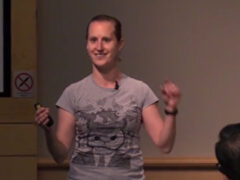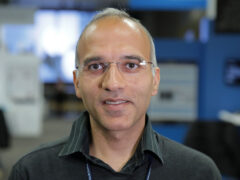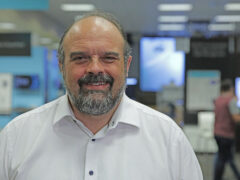Faculty Summit 2016 – Transport Protocols for Hyper-scale Networks
- Jitu Padhye, Mohammad Alizadeh, Vishal Misra, Keith Weinstein | Microsoft, Massachusetts Institute of Technology, Columbia University, Stanford University
As Internet evolves, so must transport protocols and congestion control. Today’s dominant transport protocol, TCP, was designed primarily for wide area, wired network, and for throughput-sensitive traffic. As cloud-based services, mobile internet access, internet-of-things start sourcing or sinking majority of the internet traffic, new transport protocols and new ways of thinking about congestion control are needed. The workshop will bring together leading researchers to ponder many of these issues, including, but not limited to: – As data center networks continue to evolve and use ever-more exotic technologies (e.g. free space optics), do we need changes to transport protocols? – What is the right congestion control protocol for RDMA networks? – Can wide area networks be made lossless? Do we need to? – Do we need better transport protocols for mobile networks? – Today, majority of the Internet traffic is generated by, or sent to a handful of major players (Google, Netflix, Facebook etc.). Is TCP the right solution in this scenario? – Many of today’s applications are delay sensitive (e.g. collaborative office document editing). Do we need new transport protocols for such applications? – Edge computing (also known as fog computing) is being widely deployed, and will likely play a major role in internet-of-things ecosystem. What transport protocol innovation is needed in this space?
People
Chair: Jitu Padhye (opens in new tab), Microsoft Research
Speakers:
- Mohammad Alizadeh (opens in new tab), Massachusetts Institute of Technology
- Vishal Misra (opens in new tab), Columbia University | slides
- Keith Winstein (opens in new tab), Stanford University
-
-
Casey Anderson
-
-
Series: Microsoft Research Faculty Summit
-
-
-
Cars, Computing and the Future of Work: Specific topics of mutual interest
- Linda Boyle,
- Ed Doran,
- John Lee
-
-
-
Crowd, Cloud and the Future of Work: Updates from human AI computation
- Pietro Michelucci,
- Lucy Fortson,
- Franco Pestilli
-
-
Cars, Computing and the Future of Work: A UW & MSR Workshop: Welcome and Overview of Projects
- Linda Boyle,
- Ed Doran,
- Eric Horvitz
-
-
Crowd, Cloud and the Future of Work: Welcome and Updates
- Besmira Nushi,
- Ece Kamar,
- Kori Inkpen
-
Empowering People to Achieve More: How Useful a Concept is Productivity?
- Brendan Murphy,
- Yvonne Rogers,
- Steve Whittaker
-
Keynote - The Future of Work And the Power of Data
- Johannes Gehrke
-
Productivity in Software Development
- Neel Sundaresan,
- Margaret-Anne Storey,
- Prem Kumar Devanbu
-
Artificial Emotional Intelligence, Social Systems, and the Future of Collaboration
- Mary Czerwinski,
- Mark Ackerman,
- Gloria Mark
-
Workers of the World, Connect! Tech Innovations and Organizational Change for the Future of Work(ers)
- Mary Gray,
- Jamie Woodcock,
- Louise Hickman
-
Increasing AI Programmer Productivity
- Markus Weimer,
- Sarah Bird,
- Ce Zhang
-
Human-AI Collaboration for Decision-Making
- Besmira Nushi,
- Ayanna Howard,
- Jon Kleinberg
-
Future of Spreadsheeting
- Ben Zorn,
- Felienne Hermans,
- Daniel Barowy
-
Program Synthesis meets Notebooks
- Sumit Gulwani
-
Accessible Virtual Reality
- Eyal Ofek
-
Calendar.help: A Virtual Meeting Scheduling Assistant
- Pamela Bhattacharya
-
Visual Studio IntelliCode
- Mark Wilson-Thomas
-
Microsoft Teams: Collaborate with Any Researcher Anywhere
- Jethro Seghers
-
Project Alava: Programming Webs of Microcontrollers
- James Devine,
- Teddy Seyed
-
AI in PowerPoint
- Kostas Seleskerov

























